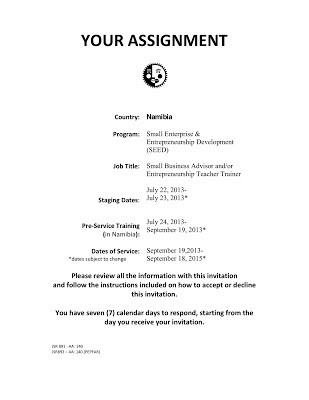My Program: Small Enterprise & Entrepreneurship Development (SEED)
My Job Title: Small Business Advisor and/or Entrepreneurship Teacher Trainer
Small Enterprise & Entrepreneurship Development (SEED). Namibia’s SEED program focuses on improving business practices and developing economic capacity in rural and urban communities, and its target groups include entrepreneurs, cooperatives, secondary schools, non- governmental organizations (NGOs), women, and youth.
As a Small Business Advisor, you will be working with a specific host country partner who supports one or more of these target groups. Throughout your service, you will also have the opportunity to work with Volunteers in Namibia’s two other programs: Community Health & HIV/AIDS and Education. Your unique skills as a SEED Volunteer will be a great asset to both your community and fellow Volunteers in-country. The SEED program has been very well-received in Namibia and stakeholders express strong interest in its continued success.
When you first arrive, you will work with a training team committed to helping you acquire the language, technical, and cross cultural skills necessary to become a successful Volunteer. As part of your training, to facilitate your language and cultural integration, you will live with a Namibian home-stay family in a community at or near the training site. Following this eight-week Pre-Service Training (PST) period, you will move to your site, where your two- year service begins. A great deal of effort is put into identifying communities throughout Namibia where you will be able to work effectively and live safely.
Why the SEED Program was developed:
On its 22nd anniversary of independence, Namibia is a young country with developed infrastructure, a stable political situation, a strong regulatory and legal environment and great potential for economic growth. In its policy framework document ―Vision 2030, the Government of the Republic of Namibia (GORN) outlines a plan rooted in such principles as good governance, partnership, capacity enhancement, people-centered development and sustainable development.
106 years of colonial rule -- coupled with the apartheid system -- deprived the Namibian people of their traditional way of life, left a tremendous skills deficit and created a highly dualistic society. Therefore, despite Namibia’s classification as a lower middle income economy, huge disparities exist. Namibia has the most unequal income/asset distribution in the world according to both the United Nations (Gini index of 74.3) and the Central Intelligence Agency (Gini index of 70.7).
The GORN cites ―high and persistent unemployment, estimated to be as high as 51.2 percent of the population, as a ―key weakness‖ in the Namibian economy. Limited job opportunities in the formal and/or government sectors coupled with inadequate skills training necessary for self employment have contributed to a perpetual—and even increasing—unemployment rate since 1970. Furthermore, an expanding urban population, primarily youth seeking improved economic opportunities, is expected to rise significantly from 43 percent in 2006 to 75 percent by 2030. This places an incredible strain on urban resources and reinforces the importance of creating diversified economic activities and skills development, especially in rural areas.
The HIV/AIDS epidemic, with a prevalence of 13.2 percent (2011), is exacerbated by and further contributes to poverty in Namibia. In the face of limited opportunity (both perceived and existing), individuals are often obliged to make decisions jeopardizing their health. Additionally, the epidemic is assumed to simultaneously increase expenses (related to medical care) and decrease household income (related to reduced labor capacity).
Peace Corps Namibia’s Small Enterprise and Entrepreneurship Development (SEED) project promotes small scale economic development through the reinforcement of entrepreneurial and business management skills in Namibian communities.
The project:
Builds on the positive efforts of the GORN in promoting entrepreneurship skills of youth as a mechanism to create future opportunities for self employment in a country where unemployment is increasingly an issue. Targets the most marginalized, vulnerable portion of the population lacking access to other financial and non financial support (potential/emerging entrepreneurs and youth throughout Namibia).
Technical support to this segment of the population is needed to help overcome the devastating income disparity that currently leaves the majority of Namibians living in poverty. Reinforces the efforts of business development support providers who bring technical support and lack the capacity for ongoing mentorship and decentralized assistance throughout the country.
Potential for collaboration is great and interest is high. Addresses teachers’ concerns surrounding the implementation of the new entrepreneurship program (that involves a new practical teaching methodology and assessment approach) without sufficient initial and ongoing training and support.

No comments:
Post a Comment